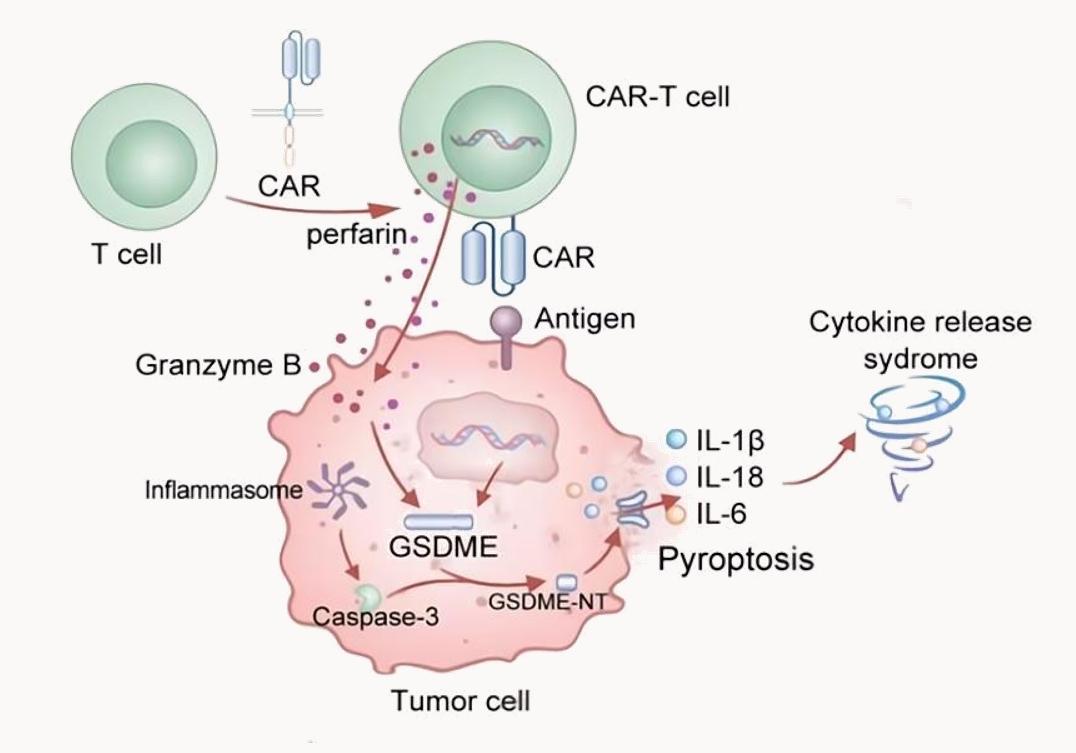CRS management drug development services, done right and on time. At Creative Biolabs, our team is dedicated to the highest standards to facilitate your drug discovery and development program. With advanced platforms and experienced experts, we are committed to taking the stress out of your program and working together with our clients to improve our health.
Background
Anti-cancer treatment with genetically engineered T cells modified with chimeric antigen receptors (CARs) has achieved major clinical success against B cell malignancies. However, the cytokine release syndrome (CRS) caused by CAR-T therapy limits the application and effectiveness of this therapy in cancer patients. After CAR-T cells infusion, they are activated and expanded rapidly, resulting in a rapid and massive cancer cell death. At the same time as anti-cancer efficacy benefit, patients also suffer the disease burden of CRS, characterized by fever, hypotension, respiratory insufficiency, etc. At Creative Biolabs, our experts are continuously investigating the mechanism underlying CRS, and exploring more strategies to develop potential treatments for CRS management.
GSDME
Gasdermin E (GSDME), also known as deafness autosomal dominant 5 (DFNA5), is a pore-forming protein, regulating cell death. It plays as a tumor suppressor gene through epigenetically inactivated in various cancer cells. Recently, GSDME was identified as a critical role in tumor cell pyroptosis which contributes to CRS associated with CAR-T cell therapy in cancer patients. Granzyme B released by CAR-T cell can trigger the cleavage of GSDME, resulting in the pyroptosis of target tumor cells. This will further lead to the activation of caspase 1 and GSDMD in macrophages, which plays a critical role in CRS triggering. Moreover, knocking out GSDME can control the CRS in mouse models. These findings indicate that GSDME is a critical molecule to mediate CRS development after CAR-T cell therapy. GSDME might be a potential target for CRS management.
GSDME Blockade for CRS Management
Based on the expertise - CAR-T cell therapy induces CRS through GSDME-mediated pyroptosis in vivo, Creative Biolabs offers a comprehensive suite of anti-GSDME drug discovery and development programs for CRS management. The elucidation of this detailed mechanism provides us with insights for CRS management strategies. Our services cover a variety of cancers with high GSDME expression, including B cell malignancies, breast cancer, melanoma cancer, lung cancer, etc. In addition, we provide end-to-end drug discovery and development services from basic discovery, mechanism exploring and validation, to in vitro and in vivo CRS management validation. Moreover, we're capable of providing preclinical and clinical pharmacology studies and clinical supports for your drug program. Our team is confident in offering accurate data to ensure your smarter "go or no-go" decisions. For drug type, we offer comprehensive drug development solutions for both small molecule drugs and therapeutic monoclonal antibody drugs to fit your specific program requirements.
 Fig.1 GSDME-mediated CRS.1
Fig.1 GSDME-mediated CRS.1
Highlights
Creative Biolabs is dedicated to providing expert solutions to clients seeking CRS management strategies to advance CAR-T cell therapy. Our mission is to offer top-quality services for academic institutions, pharmaceutical or industry companies to develop innovative therapies to improve the health throughout the world. If you have any requirements for CRS management research or therapy program, please contact us to know more.
Reference
For any technical issues or product/service related questions, please leave your information below. Our team will contact you soon.
All products and services are For Research Use Only and CANNOT be used in the treatment or diagnosis of disease.
 NEWSLETTER
NEWSLETTER
The latest newsletter to introduce the latest breaking information, our site updates, field and other scientific news, important events, and insights from industry leaders
LEARN MORE NEWSLETTER NEW SOLUTION
NEW SOLUTION
CellRapeutics™ In Vivo Cell Engineering: One-stop in vivo T/B/NK cell and macrophage engineering services covering vectors construction to function verification.
LEARN MORE SOLUTION NOVEL TECHNOLOGY
NOVEL TECHNOLOGY
Silence™ CAR-T Cell: A novel platform to enhance CAR-T cell immunotherapy by combining RNAi technology to suppress genes that may impede CAR functionality.
LEARN MORE NOVEL TECHNOLOGY NEW SOLUTION
NEW SOLUTION
Canine CAR-T Therapy Development: From early target discovery, CAR design and construction, cell culture, and transfection, to in vitro and in vivo function validation.
LEARN MORE SOLUTION